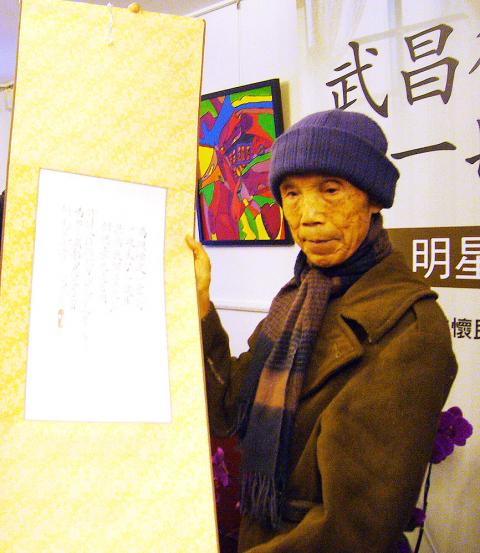Renowned poet Chou Meng-tieh (周夢蝶) died in New Taipei City on Thursday at the age of 92 from complications associated with pneumonia.
Along with his poetry, Chou was known for his monk-like habits, which he adopted after immersing himself in Buddhism later in life.
Born in China’s Henan Province in December, 1921, Chou’s original name was Chou Chi-shu (周起述).

Photo: CNA
During the Chinese Civil War, he joined the Chinese Nationalist Party (KMT) youth corps and came to Taiwan in 1948 after the KMT lost the Chinese civil war.
He was separated from his family, including his grandparents, mother, wife and children, who all remained in China.
However, after five decades apart, Chou revisited his hometown.
At 32, Chou began to write poetry, which was published in the literary pages of Central Daily News and Young Soldier Daily (the forerunner of Youth Daily News).
In the 1950s, Chou became a member of the Blue Star Poetry Society (藍星詩社), an influential gathering of mostly Chinese poets and writers.
In 1959, Chou began selling poetry and literature in front of Cafe Astoria on Wuchang Street (武昌街) in central Taipei, which was a favorite hangout of intellectuals at the time.
That year, he published a collection of poems, entitled Gudu Guo (孤獨國, Lonely Land), which is his most well-known work.
Later in life, Chou delved into Buddhism and took up Zen meditation.
A picture of Chou sitting on a street corner, quietly meditating, became one of the symbolic images of an era, showing a literary man’s solitude against the backdrop of Taipei’s hustle and bustle.
Inspired by Confucian tradition and philosophy, Chou did not pursue material gains and lived a simple life, alone, throughout his adult life.
As a poet, Chou picked up the nom de plume of “Meng-tieh” (夢蝶), which means the “dream butterfly.”
He said it was inspired by Taoist master philosopher Chuang-Tze’s (莊子) famous tale about a butterfly dream.
The name is reflects his yearning for freedom, as well as his frugal, restrained way of living.
Highly regarded in Taiwan’s cultural circles, Chou was named the first literature laureate of the National Culture and Arts Foundation in 1997.
Hung Chung-hao (洪崇豪), spokesperson for the Buddhist Tzu Chi General Hospital in New Taipei City’s Xinzhuang District (新莊) where Chou was treated, said that Chou did not have any relatives in Taiwan.
Instead, many of his student followers are helping to arrange the funeral in accordance with Buddhist traditions.
On the news of Chou’s death, the Ministry of Culture released a statement and requested that the Presidential Office issue posthumous honors for Chou.

A preclearance service to facilitate entry for people traveling to select airports in Japan would be available from Thursday next week to Feb. 25 at Taiwan Taoyuan International Airport, Taoyuan International Airport Corp (TIAC) said on Tuesday. The service was first made available to Taiwanese travelers throughout the winter vacation of 2024 and during the Lunar New Year holiday. In addition to flights to the Japanese cities of Hakodate, Asahikawa, Akita, Sendai, Niigata, Okayama, Takamatsu, Kumamoto and Kagoshima, the service would be available to travelers to Kobe and Oita. The service can be accessed by passengers of 15 flight routes operated by

Alain Robert, known as the "French Spider-Man," praised Alex Honnold as exceptionally well-prepared after the US climber completed a free solo ascent of Taipei 101 yesterday. Robert said Honnold's ascent of the 508m-tall skyscraper in just more than one-and-a-half hours without using safety ropes or equipment was a remarkable achievement. "This is my life," he said in an interview conducted in French, adding that he liked the feeling of being "on the edge of danger." The 63-year-old Frenchman climbed Taipei 101 using ropes in December 2004, taking about four hours to reach the top. On a one-to-10 scale of difficulty, Robert said Taipei 101

Taiwanese and US defense groups are collaborating to introduce deployable, semi-autonomous manufacturing systems for drones and components in a boost to the nation’s supply chain resilience. Taiwan’s G-Tech Optroelectronics Corp subsidiary GTOC and the US’ Aerkomm Inc on Friday announced an agreement with fellow US-based Firestorm Lab to adopt the latter’s xCell, a technology featuring 3D printers fitted in 6.1m container units. The systems enable aerial platforms and parts to be produced in high volumes from dispersed nodes capable of rapid redeployment, to minimize the risk of enemy strikes and to meet field requirements, they said. Firestorm chief technology officer Ian Muceus said

MORE FALL: An investigation into one of Xi’s key cronies, part of a broader ‘anti-corruption’ drive, indicates that he might have a deep distrust in the military, an expert said China’s latest military purge underscores systemic risks in its shift from collective leadership to sole rule under Chinese President Xi Jinping (習近平), and could disrupt its chain of command and military capabilities, a national security official said yesterday. If decisionmaking within the Chinese Communist Party has become “irrational” under one-man rule, the Taiwan Strait and the regional situation must be approached with extreme caution, given unforeseen risks, they added. The anonymous official made the remarks as China’s Central Military Commission Vice Chairman Zhang Youxia (張又俠) and Joint Staff Department Chief of Staff Liu Zhenli (劉振立) were reportedly being investigated for suspected “serious